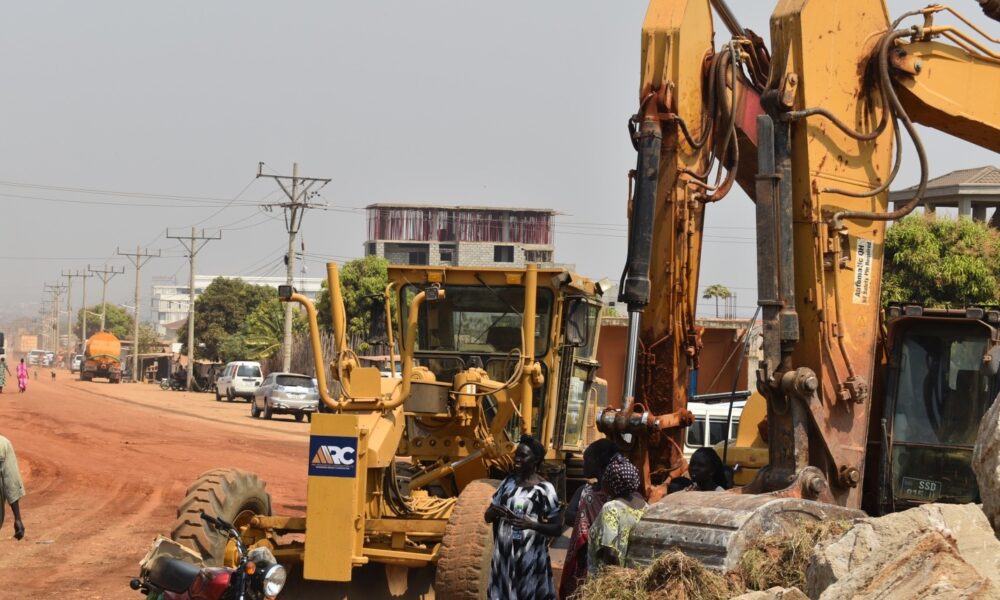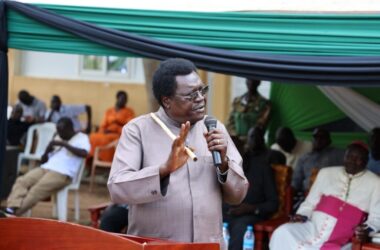By Yiep Joseph
The ambitious Juba Urban Road upgrading project, launched in January 2024, has stalled.
The initiative, launched by the National Government in partnership with the Central Equatoria State Government, aimed to construct, upgrade, and rehabilitate 35 kilometers of roads in Juba City.
With an estimated cost of approximately $35 million, the project was designed to enhance major roadways throughout the city, addressing persistent traffic congestion and improving connectivity for Juba’s residents.
It was seen as a vital step toward modernizing the city’s infrastructure and supporting economic growth.
However, despite the initial enthusiasm, confusion now reigns among the public as the project’s progress has stalled.
Almost 10 months after the launch, it appears that not even a single kilometer of the proposed road network has been tarmacked.
The event featured high-profile attendees, including former Minister of Finance and Planning Bak Barnaba Chol, former Governor of Central Equatoria State Emmanuel Adil Anthony, ARC Chief Executive Officer (CEO) Benjamin Bol Mel, and officials from the Ministry of Roads.
Africa Resource Corporation (ARC), the company contracted to rehabilitate the road has now revealed that the government has failed to finance the ‘stalled’ Juba Internal Road Project.
Engineer Kur John, ARC’s Project Manager, said in an interview that the project has not advanced due to a lack of funding.
“Since that time (January) up to now, the company has not received the promised payment from the government, and that is why the work did not progress,” Kur said.
“No single instalment was done, and that is why the work stopped,” he added.
He explained that ARC could not push the sub-contractors to work on the internal roads due to the government’s failure to provide the promised funds for the Juba Internal Roads.
“We did not receive any payment from the government; that is why there is no work being done right now,” he said.
Kur admitted that after the launch in January, there was no road upgrade except for some light work.
“The work stopped like that (no kilometres covered)—nothing much, just some light grading,” he said.
Kur revealed that ARC was demanding at least 1 million US dollars per kilometre. Therefore, the 35-kilometer internal road project in the city could cost the government around 35 million US dollars.
Kur stated that the ongoing economic challenges in the country are the main obstacle to funding the project.
He mentioned that both the ARC and the government are still grappling with the crisis.
Kur also noted that the company carries out government projects as and when they receive funding; however, the lack of funding makes it difficult to procure the necessary construction materials.
“We normally work when the government pays the money, and when there is no payment, it is hard to work because our operation is huge; we need to buy fuel, we hire machinery, we need to pay staff,” he said.
Kur said most materials are exported, and hence it has become impossible to get them to Juba without money.
However, when contacted for comment, Simon Ngor, the Director General for ICT in the Ministry of Finance and Planning requested time to gather information regarding the Juba internal roads project.
Previous promises
Speaking during the launch of the project in January, former Minister of Finance and Economic Planning, Dr. Bak Barnaba Chol pledged to launch a serious follow-up on contractors assigned to renovate Juba City Urban roads.
“This time will be a bit different. We will make accountability as a priority in deliveries of this road construction,” the minister said.
“We will follow you to make sure that you deliver this road. And we will also sit down and balance the books to see whether we have paid you or not,” Bak said.
The Minister then pledged to make timely payments to the contractors to remove some lame excuses for not delivering as agreed.
Call for accountability
Ter Manyang, Executive Director of the Centre for Peace and Advocacy (CPA) in an interview urged the government to fulfill its promises to the citizens.
“CPA is deeply concerned about the government’s lack of action following its public commitments,” he remarked.
Manyang further questioned the management of taxpayer funds, asking, “Where is the taxpayers’ money going? Citizens are paying taxes, yet there are no tangible outcomes.”
Recently, the parliament has appealed to the Cabinet to review the oil-for-road project, hoping it will address salary payments and improve infrastructure in the country.




